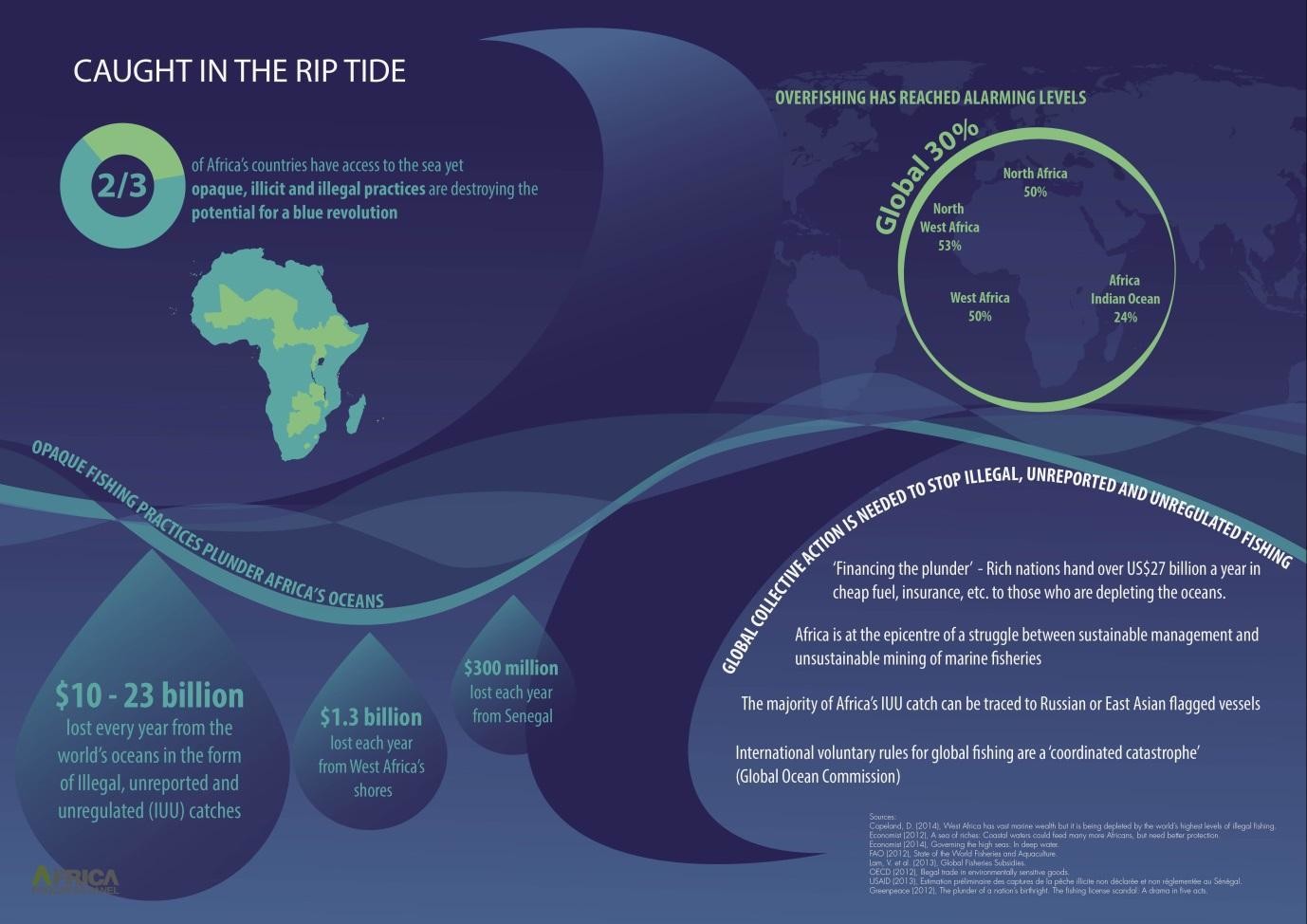Millions of Africans depend on fishing. We must stop the plunder of their oceans

For years, however, Africa’s rich coastal waters have been plundered by foreign fleets
Image: REUTERS/Simon Akam
Stay up to date:
Future of the Environment
Millions of African citizens depend on fishing for their jobs, food and income. For years, however, Africa’s rich coastal waters have been plundered by foreign fleets, often fishing illegally.
“Natural resource plunder is organized theft disguised as commerce,” according to Kofi Annan, the chair of the Africa Progress Panel (APP). “Commercial trawlers that operate under flags of convenience, and unload in ports that do not record their catch, are unethical.”
The social and economic costs of costs are huge. Illegal, unreported and unregulated (IUU) fishing represents a theft of revenue comparable to tax evasion. Overfishing – legal, but careless – reduces fish stocks, lowers local catches and harms the marine environment. It destroys fishing communities, who lose opportunities to catch, process and trade fish.

The 2014 report from the Africa Progress Panel (APP), Grain, Fish, Money: Financing Africa’s Green and Blue Revolutions noted that one large trawler can catch 250 tons of fish in one day; as much as 50 small local artisanal fishing boats in a year. It also highlighted that IUU fishing costs West Africa alone $1.3 billion per year.
Halting IUU fishing would enable African countries to unleash the full potential of their fisheries. A recent report by the Overseas Development Institute found that 300,000 new jobs could be generated if western Africa invested significantly more in the fisheries industry.
Overfishing and IUU fishing damages not only African communities, but the global economy as well. A concerted global response is thus essential to tackling it. We need collective efforts from governments, businesses and civil society groups.
The APP has consistently stressed that improved transparency is fundamental to all efforts to improve the governance of natural resources in Africa, so that their wealth is shared among the greatest number of citizens.
The fisheries sector is no exception. Many experts agree that one effective way of protecting fisheries and improving fisheries management is to increase transparency and participation.
Fortunately, concerns about sustainable fisheries and marine conservation are higher on the international political agenda than ever. If effectively implemented, two new international measures could help to swiftly halt the plunder of some of Africa’s most vital ocean resources: the 2009 Port State Measures Agreement, an international treaty to combat IUU fishing, and the global Fisheries Transparency Initiative (FiTI).
The adoption of the global FiTI Standard in Bali in late April 2017 launched a new era of transparency in fisheries. The standard is the first voluntary international agreement on what kind of transparency and participation is needed to support reasonable fisheries management and the first document to set global norms of fisheries transparency.

As APP member and FiTI founder Peter Eigen says: “Still too often, even basic information about the fisheries sector remains out of the public domain. The FiTI Standard is coming at a crucial point in time, where we all must work together to conserve and sustainably use our oceans, seas and marine resources. It sets clear requirements on what is expected from countries regarding transparency and multi-stakeholder participation in fisheries.”
So far, five countries have committed to implement the FiTI: Guinea, Indonesia, Mauritania, Senegal and the Seychelles. The APP is urging all coastal and island African countries to join them.
The APP is also encouraging all civil society groups to use the new FiTI Standard platform to push for improvements in fisheries governance and to pressure governments to act, if necessary.
The African people – the true owners of Africa’s fisheries resources – have an essential role to play in Africa’s transformation. Citizens must not shy away from actively participating where they can force change. They too have a responsibility to act in the national interest, which they must live up to.
As Kofi Annan has repeatedly said: “When leaders fail to lead, the people will lead and make them follow.”
Don't miss any update on this topic
Create a free account and access your personalized content collection with our latest publications and analyses.
License and Republishing
World Economic Forum articles may be republished in accordance with the Creative Commons Attribution-NonCommercial-NoDerivatives 4.0 International Public License, and in accordance with our Terms of Use.
The views expressed in this article are those of the author alone and not the World Economic Forum.
Related topics:
Forum Stories newsletter
Bringing you weekly curated insights and analysis on the global issues that matter.
More on Sustainable DevelopmentSee all
Sreevas Sahasranamam and Aileen Ionescu-Somers
July 10, 2025
Resilience roundtable: How emerging markets can thrive amid geopolitical and geoeconomic uncertainty
Børge Brende, Bob Sternfels, Mohammed Al-Jadaan and Odile Françoise Renaud-Basso
July 9, 2025
Rania Al-Mashat
July 7, 2025
Tim Lenton and Steve Smith
June 30, 2025
Pepe Puchol-Salort and Nicole Cowell
June 30, 2025
Naoko Tochibayashi and Mizuho Ota
June 27, 2025





